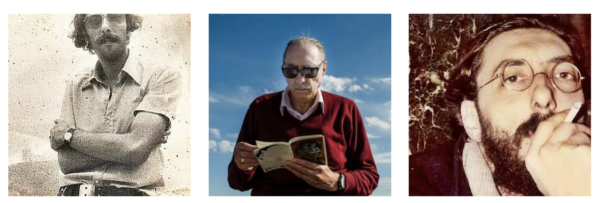
Four Poems
By Alfredo Fressia
Translated by Katherine M. Hedeen and Víctor Rodríguez Núñez

Alfredo Fressia (Montevideo, 1948-2022) was a poet, journalist, literary critic, translator and university professor. He published his poetry widely throughout Latin America and Spain. To escape the military dictatorship in Uruguay, he was exiled to São Paulo, Brazil in 1976, where he lived the rest of his life. There, he was a cultural journalist for El País in Montevideo and a professor of French literature. Fressia was a vibrant voice in contemporary Uruguayan poetry and a pioneer of queer poetry in Spanish America. He died earlier this week. We share below some of his poems translated into English.
Parenthesis
When I was born sex was destiny. No one chooses to be a poet.
0000000Women. I never loved one surely because I loved in force. It was a long,
0000000unhappy love. They loved me too without much desire or pleasure.
0000000I watched them with the nostalgia for a more beautiful life. When I tried to be
0000000better I tried to be a woman.
0000000Later on, I forgot. Devoured Adam’s rib on the desert journey. I was a man, a
0000000poet, I loved other men. I was hungry.
0000000I got to the beach of this eternal sea, the south of Brazil. My scent is virgin salt
0000000and blue iron. I know a woman will release the fish to sea with a coin in its
0000000mouth.
0000000She writes my poem. I wait.
Impudicitia
In my bed you haven’t been
the best lover, Fabio,
no attracting much attention in wars
or hunts either.
Still in the moonlight
I lick the night semen
from your young body.
You call yourself a poet,
and I know it’s unforgiveable,
Fabio, but I’m the poet here.
Failure
Arriving late the poem, the stone
thrown aimlessly from the board, struggled when born
in the violence of a volcano, the basalt poem
uncut, turned to dark cobblestone,
the granite poem was pink,
childhood cobblestones
that evoke nothing
and the poem released answerless, covering
the pavement between the future
and Marsella Street, dew
in the mornings on the stone spinning
between black and white, my neighborhood
sybil, broken stone
reads no longer
in the hardened lava of the poem.
Montevideo, La Coquette*
You’ve got to be careful talking about Montevideo because it’s a city of pain. In Montevideo you always suffer a bit more than in the rest of the world.
#
Montevideo is a city filled with dreams. That’s why no one takes care of it. And besides, you can’t be in Montevideo and be in Montevideo at the same time. In Montevideo we dream about distant countries or impossible loves or new destinies. When you’re in Montevideo and you’re almost in Montevideo you enter a dangerous state and then you hear tangos.
#
On Saturdays in Montevideo you can hear candombe. Cautiously.
#
Montevideo, the kids think it’s pretty, with its hill and fortress, and they say they were born there, there around January many, many, many years ago.
#
The sea on either side of the peninsula: Montevideo’s duplicity.
#
All of us from Montevideo know what it’s like to walk down General Flores Avenue in the early morning. That’s why no one does it. It’s a knowledge that’s revealed to you and there’s no evidence because if someone did have evidence there’d be nothing to say.
#
In a café in Montevideo, I was introduced to a man and a woman, a couple who must have been in their mid-forties. They sat down at my table and we chatted. They told me the heat that day wasn’t normal; it was supposed to rain. I said, yeah, it definitely would rain, and it would be nice to see the rain. They asked me where I lived and told me they’d gone on a trip to Brazil and the beaches were really beautiful. Buenos Aires now seemed like Paris to them. After that we talked more about wanting it to rain the next day, the rain would be nice, definitely. When they left, it was pretty late.
#
Paris is always morning, with white flowers from Boulogne and roses. In Lima and Prague it’s always evening, red, like lit up. Buenos Aires is summer night and fragrance of jasmine. When it dawns in Rio—celestial glory—it’s seven in the morning in São Paolo and the air trembles. But in Montevideo it’s always naptime, you yawn and digest your food. Don’t be so sure. It actually does gets pretty warm there.
#
He said:
0000000Money doesn’t make happiness.
0000000Work dignifies man.
0000000Montevideo is the tiny silver cup of the Plata.
He thought:
0000000I wanted to be rich, idle, and Berlinese.
#
Montevideo was a military outpost on the Plata River and was born without a name: Monte VI de Este a Oeste, Mount VI from East to West. San Felipe had fallen asleep and Santiago got scared. Then Montevideo knew boredom and war—both unmentionable—and there was never any peace and quiet after that.
#
I was in Montevideo and dreamt of a beautiful city. There were buildings made of marble and palaces and doors of bronze and casinos with gorgeous women and jewels. Everyone drank champagne and I didn’t do anything bad to anyone.
*An earlier version of this translation appears in Trusting on the Wide Air: Poems of Uruguay. Laura Chalar and Jesse Lee Kercheval, eds. Diálogos, 2019.
Poesía en acción is an Action Books blog feature for Latin American and Spanish poetry in translation and the translator micro-interview series. It was created by Katherine M. Hedeen and is currently curated and edited by Olivia Lott with web editing by Paul Cunningham.